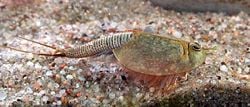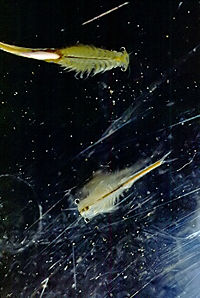Branchiopoda
| Branchiopods | ||||||||
|---|---|---|---|---|---|---|---|---|
 Triops, a notostracan
| ||||||||
| Scientific classification | ||||||||
| ||||||||
|
See text |
Branchiopoda is a diverse group of primitive, aquatic, primarily freshwater crustaceans, mostly resembling shrimp. This taxon is generally placed as a class of the arthropod subphylum (or superclass) Crustacea, but some taxonomic schemes recognize it as an order, with Crustacea listed as a class. Branchiopods should not be confused with the almost identically spelled brachiopods (without the n), which comprise an unrelated phylum (Brachiopoda) of sessile, two-shelled, marine animals (lamp shells).
There are over 900 known species of branchiopods worldwide. While generally very small, branchiopods are nonetheless very important in aquatic food chains, providing food for fish and birds. A few species are well-known, including Artemia (brine shrimp, called sea-monkeys when marketed as novelties), and Daphnia, both of which are raised as aquarium food or as interesting pets in and of themselves. Thus, as species of Branchiopoda advance their own individual function related to survival, reproduction, and self-maintenance, they also provide a larger function for the ecosystem and human beings.
Overview and description
As with other crustaceans‚ÄĒcrabs, lobsters, shrimps, copepods, krill, crayfish, barnacles, and so forth‚ÄĒbranchiopods are characterized by having branched (biramous) appendages, an exoskeleton made up of chitin and calcium, two pairs of antennae that extend in front of the mouth, and paired appendages that act like jaws, with three pairs of biting mouthparts. Crustaceans also have three distinct body parts: head, thorax, and abdomen (or pleon), one pair of compound eyes, and a tail that ends with a telson (last division of the body of a crustacean, but not a true segment). Branchiopods share with other arthropods the possession of a segmented body, a pair of jointed appendages on each segment, and a hard exoskeleton that must be periodically shed for growth.
Although a few species of water fleas have adapted to a life in the sea, branchiopods belong primarily in fresh water. All branchiopods are free-living‚ÄĒthere are no parasitic or sessile species. They generally are not adapted to life in subterranean waters or the deep sea, although water fleas (order Cladocera) of the subclass Diplostraca has hypogean representatives (inhabiting subterranean habitats), with less than 100 of the 450 recognized species of Cladocera occupying subterranean waters (Hobbs 2003).

Branchiopods are characterized by paired compound eyes and a single simple eye, as well as leaflike or phyllopodous appendages (Follo and Fautin 2001). The number of thoracic segments of Branchiopoda varies from species to species. The structure of the reproductive, nervous, and circulatory systems is primitive compared to other crustaceans. Branchiopods in general are equipped with a ventral food groove, useful for suspension and filter feeding. The water current in the ventral food groove, used for breathing and feeding in most species, is produced by a battery of unspecialized legs. This is thought to resemble a very original way of living among the crustaceans.
Branchiopods range greatly in size, from 0.2 millimeters (.007 inches) in length to 100 millimeters (3.9 inches) in length. Water fleas living in subterranean waters are very small, from 0.2 to two millimeters (.07 inches) and are laterally compressed (Hobbs 2003).
More than half of the living species of Branchiopoda are cladocerans (order Cladocera), the "water fleas" (Russell-Hunter 1969). Cladocera is mainly a freshwater group, with a few marine species. They have a carapace that covers all of the trunk, but not the head, and they have a second antenna that is main means of movement, producing the jerky or jumping swimming style that gives them the name water fleas (Russell-Hunter 1969). The majority of these are filter-feeders (like Daphnia), but there are also predaceous carnivores that feed on small crustaceans (Russell-Hunter 1969).
Members of the order Anostraca ("fairy shrimp") are the least specialized of the extant (living) branchiopods, and lack any carapace and with the limbs all similar and used for both swimming and feeding (Russell-Hunter 1969). They include genera adapted to living in concentrated brine (Artemia), brackish water (Branchipus), and fresh water (Chirocephalus and other genera) (Russell-Hunter 1969). Most of the species of Anostraca reach two centimeters in length, with some freshwater forms reaching ten centimeters in length as adults (Russell-Hunter 1969).
Leptodora, a relatively large branchiopod, relies on its very transparent body for camouflage. It is so transparent that its shadow is said to be more visible than its body.
Clam shrimp live up to their name as they are often seen burrowed in the mud like mussels at the bottom of temporary ponds. They are so well adapted to this extreme way of life that they are able to reach adulthood within a few days after inundation under optimal conditions. They can reproduce sexually, hermaphroditically, or parthenogenetically (Zenkevich 1968).
Classification
Branchiopoda commonly is considered one of six classes of crustaceans, the others including Malacostraca (largest class, with crabs, lobsters, shrimp, krill, etc), Remipedia (a small class restricted to deep caves connected to salt water), Cephalocarida (tiny, hermaphrodictic, shrimplike), Maxillopoda (barnacles and copepods, among others), and Ostracoda (small marine and freshwater animals with bivalve shells that cover the body).
However, carcinologists have long debated the taxonomic status of crustaceans, sometimes assigning the group to one of the phylum, subphylum, and superclass level, with five, six, or even ten classes recognized (Hobbs 2003). Many also list the Crustacea as a class. In taxonomic schemes that consider the Crustacea to be a class, Branchiopoda generally is considered to be a order.
There also are various taxonomic schemes for subdividing Branchiopoda. The following is the classification of Myers et al. (2008a):
- Subphylum Crustacea (crustaceans)
- Class Branchiopoda (branchiopods)
- Subclass Sarsostraca
- Order Anostraca (fairy shrimp, including brine shrimp)
- Subclass Phyllopoda
- Superorder Diplostraca
- Order Cladocera (water fleas)
- Order Conchostraca (clam shrimp)
- Suborder Cyclestherida
- Suborder Laevicaudata
- Suborder Spinicaudata
- Order Notostraca (tadpole shrimp)
- Superorder Diplostraca
- Subclass Sarsostraca
- Class Branchiopoda (branchiopods)
While the superorder Diplostraca is recognized in older classifications, and included the orders of Conchostraca and Cladocera, there is data that suggests these orders may be artificial (at least in their present state) as some of their members seem to have a paraphyletic origin within the Diplostraca. For this reason, the order Conchostraca is no longer used by some authorities. Another taxonomic scheme recognizes the following:
- Subphylum Crustacea (crustaceans)
- Class Branchiopoda (branchiopods)
- Subclass Sarsostraca
- Order Anostraca
- Subclass Phyllopoda
- Order Lipostraca†
- Order Notostraca
- Infraclass Diplostraca
- Order Laevicaudata
- Order Spinicaudata
- Order Cyclestherida
- Order Cladocera
- Subclass Sarsostraca
- Class Branchiopoda (branchiopods)
Evolution
The oldest known species of branchiopod is a 500 million year old fossil fairy shrimp called Rehbachiella kinnekullensis. Fairy shrimps also are seen as the most original and primitive members of the class.
The order Lipostraca is represented only by fossils. The genus Lipidocaris includes specimens that have been well-preserved from the Devonian age Rhynie Chert in Scotland (Russell-Hunter 1969). These lacked a carapace (as with the Anostraca) and had a pair of very large second antennae that probably were used for swimming as in the modern Cladocera (Russell-Hunter 1969).
Branchiopods probably originated in marine environments, but only those who migrated to fresh water survived. The fact that they are especially adapted to temporary pools and waters that are too extreme for other animals to live in (like salt lakes) indicates that they could have sought refuge in these places because they were unable to compete with or evade the more advanced groups of animals evolving in their original habitats. This resulted in a short generation cycle and small body size.
The large branchiopods Anostraca, Notostraca, and Conchostraca (even if it the last one seems to be a partially artificial order) are considered to be the most primitive, and most of them are still unable to live in waters where there are fish and other advanced predators, since they are too slow and vulnerable to survive them. A few of them, however, have adaptations allowing them to cope with this problem well enough to survive, even with predators around them.
The small branchiopods, mostly represented by water fleas, have succeeded in becoming zooplankton in such a degree that waters filled with fish and other threats are no longer a problem. Their main adaptation for survival is their high number thanks to their small size, ability to produce many offspring, and short life cycle.
ReferencesISBN links support NWE through referral fees
- Follo, J., and D. Fautin. 2001. Branchiopoda Animal Diversity Web (online). Retrieved May 26, 2008.
- Hobbs, H. H. 2003. Crustacea In Encyclopedia of Caves and Karst Science. Routledge. Retrieved December 5, 2006.
- Myers, P., R. Espinosa, C. S. Parr, T. Jones, G. S. Hammond, and T. A. Dewey. 2008a. Class Branchiopoda (branchiopods) The Animal Diversity Web (online). Retrieved May 26, 2008.
- Myers, P., R. Espinosa, C. S. Parr, T. Jones, G. S. Hammond, and T. A. Dewey. 2008b. Phylum Brachiopoda The Animal Diversity Web (online). Retrieved May 26, 2008.
- Russell-Hunter, W. D. A Biology of Higher Invertebrates. London: Macmillan Company, 1969.
- Zenkevich, L. A. 1968. Zhizn Ļ zhivotnykh (The Animal Life), Volume 2, Chapter 7 (Phylum Arthropoda). Moskva: "Prosveshchenie." OCLC 13589037.
| |||||||||||||||||
Credits
New World Encyclopedia writers and editors rewrote and completed the Wikipedia article in accordance with New World Encyclopedia standards. This article abides by terms of the Creative Commons CC-by-sa 3.0 License (CC-by-sa), which may be used and disseminated with proper attribution. Credit is due under the terms of this license that can reference both the New World Encyclopedia contributors and the selfless volunteer contributors of the Wikimedia Foundation. To cite this article click here for a list of acceptable citing formats.The history of earlier contributions by wikipedians is accessible to researchers here:
The history of this article since it was imported to New World Encyclopedia:
Note: Some restrictions may apply to use of individual images which are separately licensed.